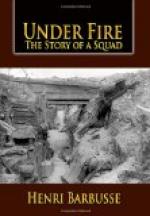“You’re going it a bit strong!”
“Ask Euterpe the cyclist if it isn’t true. I tell you he did it along of me, too. We shoved our arms inside the boots and pulled out of ’em some bones and bits of sock and bits of feet. But look if they weren’t worth while!”
So, until Caron returns, Poterloo continues on his behalf the wearing of the Bavarian machine-gunner’s boots.
Thus do they exercise their wits, according to their intelligence, their vivacity, their resources, and their boldness, in the struggle with the terrible discomfort. Each one seems to make the revealing declaration, “This is all that I knew, all I was able, all that I dared to do in the great misery which has befallen me.”
* * * * * *
Mesnil Joseph drowses; Blaire yawns; Marthereau smokes, “eyes front.” Lamuse scratches himself like a gorilla, and Eudore like a marmoset. Volpatte coughs, and says, “I’m kicking the bucket.” Mesnil Andre has got out his mirror and comb and is tending his fine chestnut beard as though it were a rare plant. The monotonous calm is disturbed here and there by the outbreaks of ferocious resentment provoked by the presence of parasites—endemic, chronic, and contagious.
Barque, who is an observant man, sends an itinerant glance around, takes his pipe from his mouth, spits, winks, and says—“I say, we don’t resemble each other much.”
“Why should we?” says Lamuse. “It would be a miracle if we did.”
* * * * *
Our ages? We are of all ages. Ours is a regiment in reserve which successive reinforcements have renewed partly with fighting units and partly with Territorials. In our half-section there are reservists of the Territorial Army, new recruits, and demi-poils. Fouillade is forty; Blaire might be the father of Biquet, who is a gosling of Class 1913. The corporal calls Marthereau “Grandpa” or “Old Rubbish-heap,” according as in jest or in earnest. Mesnil Joseph would be at the barracks if there were no war. It is a comical effect when we are in charge of Sergeant Vigile, a nice little boy, with a dab on his lip by way of mustache. When we were in quarters the other day, he played at skipping-rope with the kiddies. In our ill-assorted flock, in this family without kindred, this home without a hearth at which we gather, there are three generations side by side, living, waiting, standing still, like unfinished statues, like posts.
Our races? We are of all races; we come from everywhere. I look at the two men beside me. Poterloo, the miner from the Calonne pit, is pink; his eyebrows are the color of straw, his eyes flax-blue. His great golden head involved a long search in the stores to find the vast steel-blue tureen that bonnets him. Fouillade, the boatman from Cette, rolls his wicked eyes in the long, lean face of a musketeer, with sunken cheeks and his skin the color of a violin. In good sooth, my two neighbors are as unlike as day and night.




